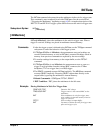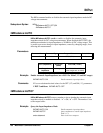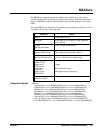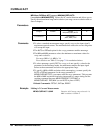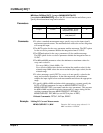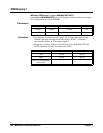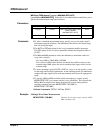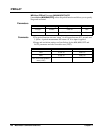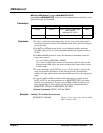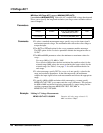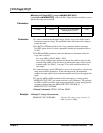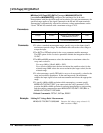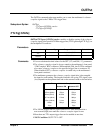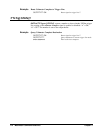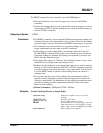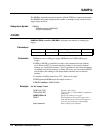
Multimeter Command Reference 107Chapter 3
:RESistance?
MEASure:RESistance? [<range>|MIN|MAX|DEF|AUTO
[,<
resolution>|MIN|MAX|DEF]] selects the 2-wire ohms function and allows you to
specify the range and resolution.
Parameters
Comments • To select a standard measurement range, specify range as the input signal’s
maximum expected resistance. The multimeter then selects the correct range to
accept the input.
• The AUTO or DEFault option for the range parameter enables autorange.
The
DEF option for the resolution parameter defaults the integration time to
10 PLC.
• The MIN and MAX parameters select the minimum or maximum values for
range and resolution:
For range:
MIN = 100
Ω
; MAX =100M
Ω
For resolution:
MIN selects the best resolution (the smallest value) for the
selected range.
MAX selects the worst resolution (the largest value) for the
selected range.
• To select autorange, specify DEF for range or do not specify a value for the
range and resolution parameters. In the autorange mode, the multimeter
samples the input signal before each measurement and selects the appropriate
range.
• To specify a MIN or MAX resolution while autoranging, you must specify
AUTO or DEF for the range parameter as in MEAS:RES? DEF (you cannot
omit the range parameter). This prevents the
MIN or MAX resolution from
being interpreted as a range setting and the resulting command becomes
MEAS:RES? DEF,MIN or MEAS:RES? DEF,MAX.
• Related Commands: FETCh?, INITiate, READ?
Example Making 2-Wire Ohms Measurements
MEAS:RES? 1320,MAX
Function: 2-wire ohms; range selected: 10kΩ;
MAX resolution: 1.0Ω.
Parameter Name Parameter Type Range of Values Default Units
<
range>
numeric 100Ω|1kΩ|10kΩ| 100kΩ|1MΩ|
10MΩ|100MΩ|
MIN|MAX|DEF|AUTO
ohms
<
resolution>
numeric
resolution|MIN|MAX|DEF
ohms



